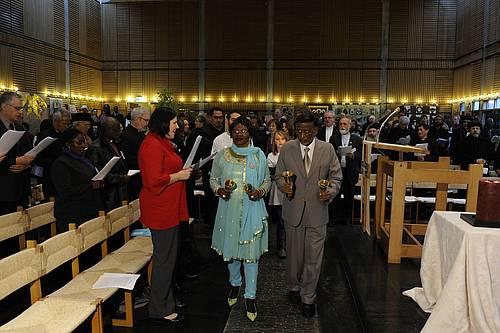The International Ecumenical Peace Convocation, the situation of Christians in the Middle East and the proposed changes in the internal structure of the organization, are among the main items on the agenda of the Central Committee of the World Council of Churches, meeting from 16 to 22 February at the Ecumenical Centre in Geneva.
The Central Committee is the primary decision-making body of the WCC and meets every 18 months to reflect, celebrate and deliberate about the work being done as well as design and ratify the future work of the council.
At the opening worship, which had the biblical text reference Luke 2:14, the theme of just peace was emphasized. "The Christian meaning of inner peace is deeper and broader than the impassivity of the Stoics or the nirvana of the Buddhists. It is not related to apathy for what happens around us," said Archbishop Prof. Dr Anastasios of Tirana, Durres and All Albania.
The highlights on the agenda of the first day were the address by the moderator and the general secretary's report.
Rev. Dr Walter Altmann, moderator of the Central Committee since 2006, reflected, among other things, on the choice of topic for the next WCC Assembly and the structural changes within the council that are being taken to decision making in this meeting.
Altmann said the Central Committee needed to deal with "considerations and suggestions taking into account the changed financial situation in which the World Council of Churches has to operate, with far fewer resources than it had at its disposal in the past. However, the proposals, if approved and implemented, will represent a considerable saving for the World Council of Churches, which is important, not only in the present situation of scarcer resources, but also for the sake of responsible stewardship itself."
In his report, the general secretary, Rev. Dr Olav Tveit Fykse, who recently completed his first year in office, paid special attention to preparations for the International Ecumenical Peace Convocation to be held in May this year in Kingston, Jamaica. "This event will manifest and strengthen our joint efforts in pursuit of the goal of overcoming violence," said Tveit.
Tveit and Altmann also marked the emergence of more concrete signs of building peace in the Middle East. For the secretary general, "there is an important role in our fellowship of churches play in this scenario, to continue reflecting and contributing to the democratic processes and the construction of justice and peace. The role of churches and ecumenical partners in the recent negotiations in Sudan is a rich example."
The theme of peace in the Middle East has gained more ground due to recent events in Egypt and Tunisia. For Altmann, even if the issue of just peace "has not been at the centre of the demonstrations in the Arab countries, they also reveal once again the pressing need to achieve peace in the Middle East, a peace in which the legitimate rights of peoples are guaranteed and historical injustices righted and amends made", he said.
Full text versions of the presentations







